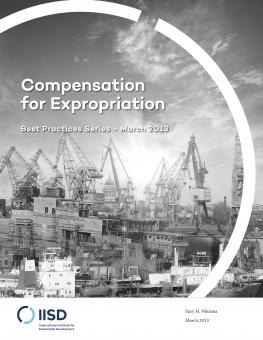
IISD Best Practices: Compensation for Expropriation
This paper analyzes the principles governing compensation for expropriation, as well as the primary methods of calculating the amount.
The issue of compensation for foreign investors adversely affected by expropriation in their host State has always led to a profound divergence of views in international investment law centered on whether or not there existed an international obligation on the part of a host State to compensate foreign investors for expropriated investments.
Major capital-exporting countries generally defended the existence of such an obligation, while newly independent countries and communist countries challenged the right of foreign investors to receive compensation in the event of expropriation on various legal grounds, such as national treatment, or to address economic inequalities borne out of "colonial sin" or excessive profits. Today, some of these controversies are no longer in dispute. Investment protection treaties and customary international law now obligate host States to protect foreign investments such that any expropriation must be done according to certain rules.
The objective of this paper is to analyze, from a legal perspective, the principles governing compensation for expropriation, as well as the primary methods of calculating the amount. In our conclusion, we emphasize that our most important recommendation for signatory States to BITs is to define more clearly what can be qualified as indirect expropriation when certain types of legitimate laws and regulations are at issue. In addition, States are strongly recommended to be more precise when drafting clauses related to compensation for expropriation in order to address certain current problems. While it is impossible to find a magic formula good enough to apply to all situations, it is possible to guide the tribunals which will have to assess the compensation payable for expropriation. This clarification of standards for calculating compensation is particularly necessary in the case of indirect expropriation, because its evaluation can be very complex.
Participating experts
Additional downloads
You might also be interested in
IISD Best Practices Series: The Most-Favoured-Nation Clause in Investment Treaties
This IISD Best Practices paper studies the most-favoured-nation (MFN) clause in investment treaties and its interpretation by arbitral tribunals, drawing lessons for states.
IISD Best Practices Series: Exhaustion of Local Remedies in International Investment Law
Part of IISD’s Best Practices Series, this advisory bulletin reviews state-of-the-art options and approaches to the exhaustion of local remedies requirement in international investment law.
IISD Best Practices Series: Performance Requirements in Investment Treaties
This paper surveys the types of performance requirements (PRs) in use around the world, and briefly describes the WTO’s Agreement on Trade-Related Investment Measures (TRIMs).
IISD Best Practices Series: State-State Dispute Settlement Clause in Investment Treaties
This paper looks at state–state dispute settlement provisions in international investment agreements, examining the different mechanisms used to settle investment disputes, including judicial, quasi-judicial and arbitration procedures.